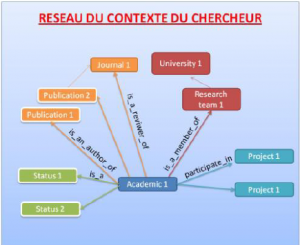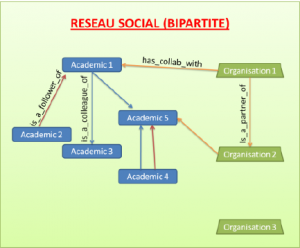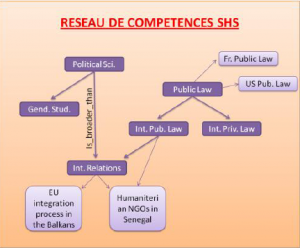1. Infonomics Ressource Facility (IRF)
Summary
Data acquisition, management and processing are undergoing a real revolution due to the recent developments in Information and Communications Technology (ICT) and the storage and calculation capacities that have become available at accessible prices over the past few years. This revolution should have a positive impact on Humanities and Social Sciences (HSS). Indeed, data acquisition, management and processing tools open new horizons for surveys (“survey” in the wide sense as used by John Dewey), which were previously unattainable in terms of both quantity and quality. The capacity to acquire and process data on individual and collective behaviour, the difficulties to grasp the extent of social interactions, actions and individual and collective activities to their full extent constitute all as many significant obstacles for the development of HSS. This also applies to the almost complete absence of automatic and systematic means of analysis of textual documents (archives, published texts, interviews, etc.), sound documents (interviews, radio documents, scenes, etc.) or iconographical data (images, video, films, etc.). Even though they are still imperfect, their developments (notably in the domain of text and semantic analyses) are already opening unprecedented perspectives for processing data acquired in survey processes. With this revolution in the means of producing, analysing, disseminating and developing information, HSS should be capable of bridging a new qualitative gap, of constituting and exploiting massive datasets and, in this way, of progressing from a point that is sometimes perceived as being “pre-scientific” to a status of maturity comparable with that of matter and life sciences. This would mean progressing from the use of small datasets that lead to limited empirical qualitative studies, often due to a lack of means, to the use of massive datasets and systematic empirical data analysis systems (texts, images, and sound) that associate qualitative and quantitative methodologies. This revolution offers HSS unprecedented objectivity through reproducible quantitative results. Via these new approaches for carrying out surveys and exploiting the massive quantities of data collected, it also gives them new levels of credibility and the means of generating more knowledge and, from a pragmatic point of view, will open them up more readily to knowledge that can be operationalized and made easy to activate. HSS play a central role in terms of creating, discovering and disseminating information amongst socio-economic actors (politicians, industrialists, citizens, etc.). Therefore, it is legitimate to wonder again about the complex mechanisms by which information is created, disseminated and modified in order to then take action on one’s own natural or artificial means of production. It is true to say that today information, considered to be pertinent data for the person who receives it, is a socio-economic, scientific and cultural product. An increasingly large part of human activity is no longer devoted to producing material objects, but devoted at feeding continuous flow of information. In this project, we initiate a two-dimensional reflection. One epistemological, aimed at understanding and improving the characterisation of laws that govern information in its own right and, the other, praxeological, for designing, deploying and implementing new original methodologies, which breaks with conventional approaches, capable of improving understanding of the complex phenomena that constitute the main part of HSS research. This problem places us at the heart of a newly born discipline called INFONOMICS, whose name comes from a combination of the first letters of the word “information”, from the Latin informare, which means “to give form”, and the term “nomics” which comes from the ancient Greek word νόμος, nómos, and which means “law”. By definition, infonomics deals with the rules and laws related to information. Therefore, by analogy with the word “economy”, which designates an activity covering the production, distribution, exchange and consumption of goods and services, INFONOMICS is concerned by the way to produce, disseminate and use non-material contents: data, information, knowledge, know-how, etc. Amongst all the scientific challenges to be taken up, there is the challenge of formalising an information theory complimentary to that of Shannon, which would better take into account of semantic data. Amongst the technological challenges to be faced, there is a the development of methodologies that enable complex questions in humanities and social sciences to be processed, such as in vivo observation, scaling down high-volume digital records scalability, merging multisource of data and dealing with complex data, etc. The approach we propose is based on multidisciplinary collaboration at the frontiers between ICT and HSS. In this way, epistemological reflections will be made within the European Network for Infonomics (ENI) that is being set up at present. Reflections on original methodologies and breaking processes will be carried out by using a benchmarking approach for HSS research work made within the PANELS platform in common to the ISH (Institut des Sciences de l’Homme) and the EVS (Environnement Ville et Société) laboratory in liaison with social, economic partners such as the “Grand Lyon” Living Lab, the “Cité du Design” in Saint Etienne and the “Région Rhône-Alpes”. As a result, the IRF (Infonomics Resources Facility) will be one of the rare structures in the world devoted to Infonomics and which will more particularly deal with coordinating, organising, and evaluating the research work concerned. Expected results will be materialised by theoretical and methodological contributions feeding the epistemological corpus of Infonomics and, at the same time, providing new practical levers in order to improve significantly the performance and relevance of survey in Humanities and Social Sciences, thereby possessing considerably more data capable of providing stronger links between quantitative and qualitative analyses. Lastly, the IRF could become an international leader think tank in Infonomics.
For more details see : http://infonomics.ish-lyon.cnrs.fr
Coordination
Djamel Abdelkader Zighed (ISH, Univ. Lyon 2)
Parteners
ISH – USR 3385 : Institut des Sciences de l’Homme EVS – UMR 5600 : Environnement, ville, société LHC– UMR 5516 : Laboratoire Hubert Curien
Finincing
Université de Lyon : Programme Avenir Lyon Saint-Etienne(PALSE) Période : 2013-2015
2. SHS-Doc-NET
Summary
 SHSH-Doc-Net (Social and Competencies Network) project aims at developing a web portal based upon the innovative technologies of the social semantic web in the goal of emphasizing the competencies developed by academics of the University of Lyon in the Social Sciences and Humanities (SSU) fields. The portal is thus a collaborative application that is dedicated to academics who could be professors, researchers, engineers or phd students.
SHSH-Doc-Net (Social and Competencies Network) project aims at developing a web portal based upon the innovative technologies of the social semantic web in the goal of emphasizing the competencies developed by academics of the University of Lyon in the Social Sciences and Humanities (SSU) fields. The portal is thus a collaborative application that is dedicated to academics who could be professors, researchers, engineers or phd students.
 The main objectives of the application are to allow the latter to expose their competencies and scientific skills, to manage their professional online identity over the web, to benefit from different services in the context of scientific watch. The project also targets another king of users which are socioeconomic or cultural organizations that are interested in SSU competencies and willing to develop scientific or business partnerships with academics. For this type of users, the portal offers several services to notify, recommend or visualize SSU competencies and experts.
The main objectives of the application are to allow the latter to expose their competencies and scientific skills, to manage their professional online identity over the web, to benefit from different services in the context of scientific watch. The project also targets another king of users which are socioeconomic or cultural organizations that are interested in SSU competencies and willing to develop scientific or business partnerships with academics. For this type of users, the portal offers several services to notify, recommend or visualize SSU competencies and experts.
 Lastly, the third kind of users that are concerned with the project are any individual that wants to find general or precise pieces of information about the SSU expertises that are developed in the research units of the university. Such individuals could be a prospective student, a librarian or a public organization that is in charge of developing relationships between universities and companies. In France, there is no application that offers solutions to the aforementioned needs.
Lastly, the third kind of users that are concerned with the project are any individual that wants to find general or precise pieces of information about the SSU expertises that are developed in the research units of the university. Such individuals could be a prospective student, a librarian or a public organization that is in charge of developing relationships between universities and companies. In France, there is no application that offers solutions to the aforementioned needs.
Partners
Institut des Sciences de l’Homme USR 3385 CNRS, ERIC EA3083 Lyon 2.
Financing
BQR Université Lyon 2
3. FLURESP
Summary
 Cost-effectiveness assessment of European influenza human pandemic alert and response strategies. The FLURESP project is currently expecting professional offers to design, develop, programme and simulate advanced cost-effectiveness models.
Cost-effectiveness assessment of European influenza human pandemic alert and response strategies. The FLURESP project is currently expecting professional offers to design, develop, programme and simulate advanced cost-effectiveness models.
Partners
It Gathers 8 European partners : France, Italy, Hungary, UK, Poland, Spain, Greece and Romania.
Financing
Project funded by the European Commission through the Directorate-General for Health and Consumers of the European Commission under grant agreement nr. 2010 11 01.


